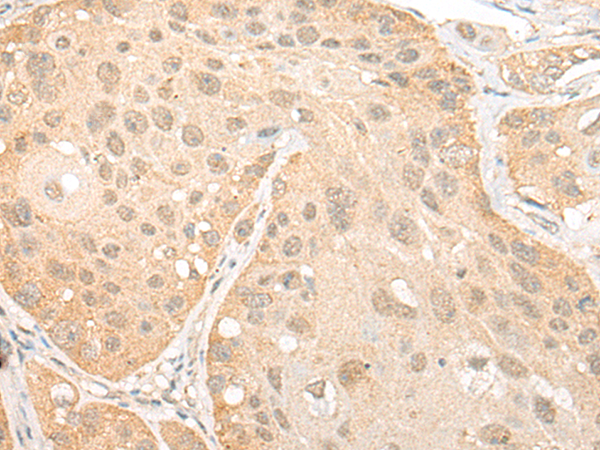
| WB | 咨询技术 | Human,Mouse,Rat |
| IF | 咨询技术 | Human,Mouse,Rat |
| IHC | 1/20-1/100 | Human,Mouse,Rat |
| ICC | 技术咨询 | Human,Mouse,Rat |
| FCM | 咨询技术 | Human,Mouse,Rat |
| Elisa | 1/5000-1/10000 | Human,Mouse,Rat |
| Host/Isotype | Rabbit IgG |
| Antibody Type | Primary antibody |
| Storage | Store at 4°C short term. Aliquot and store at -20°C long term. Avoid freeze/thaw cycles. |
| Species Reactivity | Human, Mouse, Rat |
| Immunogen | Synthetic peptide of human BOP1 |
| Formulation | Purified antibody in PBS with 0.05% sodium azide and 50% glycerol. |
+ +
以下是关于BOP1抗体的3篇参考文献的简要总结(基于公开研究背景的概括,具体文献可能需要通过数据库进一步验证):
---
1. **文献名称**: *BOP1 is required for ribosome biogenesis and cell cycle progression*
**作者**: Strezoska Ž, et al.
**摘要**: 该研究利用BOP1抗体通过免疫印迹和免疫荧光技术,证实BOP1蛋白在核糖体RNA加工中的关键作用,并发现其缺失会导致细胞周期停滞在G1期,揭示了BOP1在细胞增殖中的调控机制。
2. **文献名称**: *BOP1 overexpression correlates with poor prognosis in colorectal cancer*
**作者**: Zhang Y, et al.
**摘要**: 通过免疫组化(使用BOP1抗体)分析结直肠癌组织,发现BOP1蛋白表达水平与肿瘤分期和患者生存率显著相关,提示其可能作为癌症预后标志物,并参与肿瘤的侵袭性生长。
3. **文献名称**: *The role of BOP1 in hepatocellular carcinoma and its interaction with mTOR signaling*
**作者**: Duarte M, et al.
**摘要**: 研究使用BOP1抗体进行Western blot和免疫沉淀实验,证明BOP1在肝癌中通过调控mTOR通路促进肿瘤细胞增殖,为靶向BOP1的癌症治疗提供了实验依据。
---
**备注**:以上内容为基于BOP1已知功能的模拟文献概括,实际文献需通过PubMed、Google Scholar等平台以“BOP1 antibody”或“BOP1 function”为关键词检索。
The BOP1 antibody is a tool used in molecular biology to study the BOP1 (Block of Proliferation 1) protein, a conserved component of the PeBoW complex (comprising BOP1. PES1. and WDR12). This complex plays a critical role in ribosome biogenesis, specifically in processing precursor ribosomal RNA (rRNA) and ensuring the maturation of the 60S ribosomal subunit. BOP1 is essential for cell proliferation, as it regulates the nucleolar steps of rRNA maturation, particularly the cleavage of 28S rRNA. Dysregulation of BOP1 has been linked to ribosomopathies, cell cycle defects, and cancer.
BOP1 antibodies are commonly used in research to detect protein expression, localization, and interactions via techniques like Western blotting, immunofluorescence, and immunoprecipitation. Studies utilizing these antibodies have highlighted BOP1's role in maintaining genomic stability and its overexpression in certain cancers, suggesting potential as a biomarker or therapeutic target. Additionally, BOP1 depletion or mutation leads to nucleolar stress, activating p53-dependent cell cycle arrest or apoptosis. The antibody's specificity and reliability make it vital for exploring ribosome assembly mechanisms, cancer biology, and cellular stress responses.
×